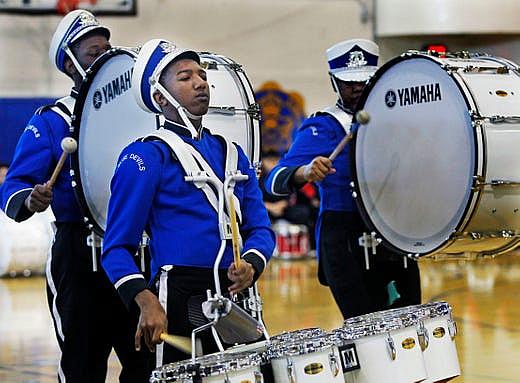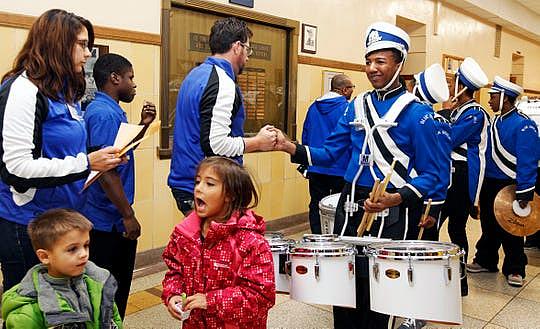How a Milwaukee community garden helped turn a struggling boy into 'Lil Obama'
James E. Causey’s reporting on this project was completed with the support of a USC Annenberg Center for Health Journalism grant.
Other stories in this series include:
I returned to the 53206 neighborhood — and saw some boys turn into men
Want to get involved in a community garden? It's not all weed-pulling.
How a Milwaukee community garden helped turn a struggling boy into 'Lil Obama'
Milwaukee couple make it their mission to give trauma victims the chance to talk and be heard
A reporter shares lessons from a Milwaukee garden trying to save at-risk boys
In Milwaukee's poorest ZIP code, fruits and vegetables become powerful weapons for saving young boys

Maleak Taylor (left), a freshman at North Divison High School, plays quints for the drumline.
Angela Peterson / Milwaukee Journal Sentinel
On a Saturday four years ago, Maleak Taylor followed some cousins to a community garden at the corner of North 9th and West Ring streets in Milwaukee.
There were dozens of boys there. Maleak, then 10, was eager to earn $20 for four hours of weed-pulling and trash-picking. Now 14, Maleak realizes he was hungry for something else: Support. Guidance. A father figure.
A chance.
Enter Andre Lee Ellis.
Ellis, an actor-turned-activist, founded the "We Got This" program five years ago. It is aimed squarely at boys like Maleak, who has a father in prison, a mother struggling to make ends meet and, often, lots of pent-up anger.
“I was mad because my father wasn’t around," Maleak said. "He was locked up for drugs and a murder. I see how much my mom has to struggle to raise me and my little brother. I feel like if he was there, things could have been a lot easier for us.”
Through the program, Maleak was able to hear and meet Barack Obama in October 2014, when the president visited nearby North Division High School. He even got to shake Obama's hand.
"Right after that, Mr. Andre started calling me 'Lil Obama,' ” he said.
The nickname stuck — in part because of their matching ears, but more because of what Maleak committed himself to doing: Studying. Working. Getting better.
“At first it bothered me, because I knew it was a lot to live up to,” Maleak said of the nickname. “But when I thought more about it, I was like ‘Why not?’ I’ve been called worse.”
In June, Maleak graduated as salutatorian of LaFollette School and over the summer was part of a YMCA-sponsored civics program that took him to Washington, D.C., for a week. The students were able to tour the White House and Capitol.
Maleak is now a freshman at North, where he's the school's Blue Devil mascot and plays the quints on the drumline. In September, the drumline performed in the Circle City Classic Parade in Indianapolis.
"Most freshmen come in and they act like freshmen," said Paul Braun, co-director of the drum line. "You don't see that from Maleak. He's a real leader, and the drumline will go as he goes."
Braun sees a bright future for Maleak.
"I'm hard on him because I know he can handle it," Braun said. "If he sticks with it, he can earn a college scholarship to an HBCU (historically black colleges and universities)," he said. "He can be that good."
Paul Braun, co-director of the North Division High School Drumline (left) shakes Maleak Taylor's hand, before the start of the MPS Hosts City Drumline Competition at Rufus King High School. "Most freshmen come in and they act like freshmen. You don't see that from Maleak. He's a real leader and we (the drum line) will go as he goes. He's the leader," said Braun. (Photo: Angela Peterson/Milwaukee Journal Sentinel)
When Maleak was at LaFollette, Ellis would stop in to check in on him and other boys with connections to the garden.
"He was there for my graduation," Maleak said. "And he’s been there for my family to help us out when we needed it. Stuff that doesn’t have anything to do with the garden.”
Response to stern approach
Maleak started coming to the garden soon after his family moved into the area.He was younger than most; the garden is aimed at those 12 to 17, but Ellis can be loose with requirements if a boy needs the attention.
Their relationship was not always smooth; Maleak didn't always respond well to Ellis' stern approach.
“I remember one time I was doing something that he didn’t like, and it got heated," Maleak said. "I said some curse words and he said some back.
"He won that argument though. He started to win me over after that because he told me that he loved me and he wasn't going to lose me to the streets."
Without a father at home, Maleak said it was hard to trust anyone, especially men.
“I just figure a lot of them say stuff and don’t mean it or they don’t keep their promise, and I was tired of being hurt.”
His family has known poverty and homelessness. Last year, Maleak lost a cousin and friend — both of whom participated in the summer garden program — to gun violence.
His cousin, Deaundra Taylor, 15, was shot Nov. 1, 2017, in an alley in the 2900 block of N. 5th St. — across the street from the 5th District Police Station. He died at a hospital.
His friend, Dennis "Booman" King, 15, was found beaten and stabbed to death in an abandoned home in the 3300 block of North 11th Street. He was reported missing by police on May 19. His body was found May 20.
Malik Terrell, 22, was charged in the death of King. Terrell allegedly beat King with a hammer and set his body on fire because he thought King knew about a robbery of a video game.
“I worry about him because you don’t want your child to have to deal with adult things," said Whitney Taylor, 32, Maleak's mother. "He’s known too many people to get shot and killed."
Taylor credits a lot of her son’s perseverance to the coping skills he learned while working with the mentors in the garden the past summers — and Ellis himself.
“He knows how to talk to our kids,” she said. “He talks to our kids in a way that their fathers’ would, or should, and it makes a difference.”
Maleak agreed.
“Sometimes you say to yourself why me? Or, why is this happening to us?” Maleak said. “But Andre used to always tell me to not let things that happened to me stop me from being successful.”
The Washington, D.C., experience left a strong impression on him.
“There was one other black student who went, but it was pretty cool because it was my first time out of Wisconsin, unless you consider Illinois,” he said. “It opened my eyes to a lot of things that were bigger than Milwaukee.”
It opened his mind to the idea of a career in politics.
“If I get into politics, I would really look at some of the policies that land black people in prison forever," he said. "It’s just not right. It breaks up homes and a lot of people end up there because they don’t have opportunities to better themselves.
"You have to think big."
[This story was originally published by Journal Sentinel.]

